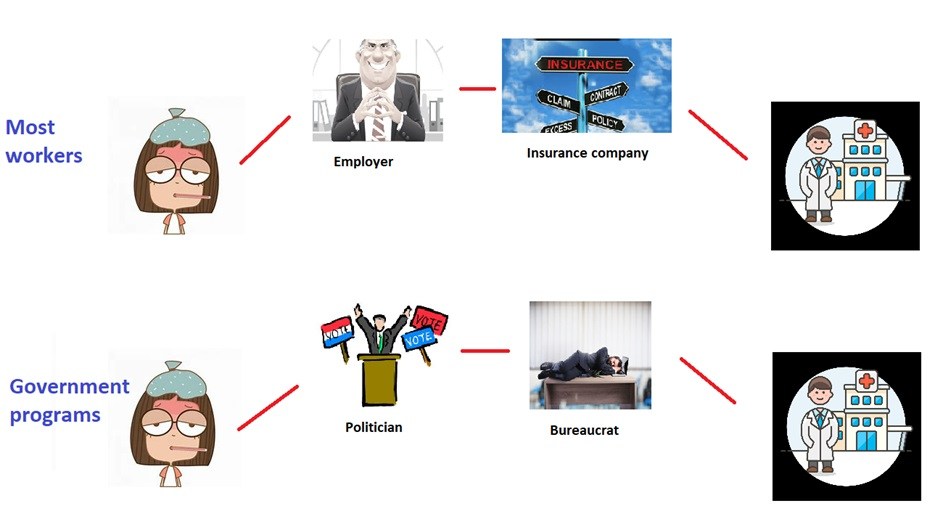
I’m on my way back to the United States from England. My election-week coverage (starting here and ending here) is finished, but I’m still in the mood to write about the United Kingdom.
Yesterday, I shared some “Great Moments in British Government” and today I want to look at the U.K.’s single-payer health scheme.
The National Health Service (NHS) is inexplicably popular. Boris Johnson and Jeremy Corbyn basically competed over who would dump the most money into the system.
This near-universal affection is a mystery. There’s a lot of data suggesting the system doesn’t work.
Consider these details from a column by a British doctor.
One of the most curious political phenomena of the western world is the indestructible affection in which the British hold their National Health Service. No argument, no criticism, no evidence can diminish, let alone destroy, it. …Yet again, however, the NHS is in ‘crisis.’ The British Red Cross has called the present situation an incipient humanitarian crisis, as if the country were now more or less in the same category as Haiti after a hurricane… The current NHS has a budget 50 per cent greater than it had 10 years ago. It employs 25 per cent more doctors than it did then. …but the net result, according to those who say the present situation is the worst ever, is that it is less able than ever before to perform satisfactorily its most elementary tasks such as treating emergencies promptly. …The difference in the standard mortality rate of the richest and poorest is now almost double what it was when the NHS began. …in 2014 the Commonwealth Fund of New York, a foundation whose purpose is to promote an effective, efficient and equitable health care system, published a report in which it compared 11 western health care systems. …The measure on which it was next to worst was the number of deaths preventable by health care. …thousands of people die every year in Britain who would have been saved in any other country in Europe.
Here are some passages from a recent editorial by the Wall Street Journal.
The NHS managed to treat only 83.6% of emergency-room patients within four hours in October, compared to 89.1% a year earlier and well short of the government’s target of 95%. …The NHS also missed its target for 93% of patients with suspected cancer to be seen by a specialist within two weeks of referral by a family doctor. In September, 90.1% of patients saw a specialist within two weeks, down from 91.2% in September 2018. A bureaucrat or Senator Elizabeth Warren might think that’s good enough for government work. But it’s definitely not for the nearly 10% of patients and their families who had to live with a suspected cancer diagnosis… Politicians who want a U.S. version of the NHS via Medicare for All should explain why they want Americans to catch this British disease.
Here are some insights from a former British hospital director.
…the people at the very top of the NHS’s regional and national organisations still truly believe in command and control. They are the only people left who still believe in the power of the five year plan to solve pressing public policy problems. They set targets in the same way as the managers of the Soviet tractor factories… The hospital I was involved in had a problem with its A&E waiting times. We were provided with “help” from multiple NHS intervention teams. There were so many of them that they arrived in a bus… Each of them wanted slightly different information, each had a different view of what the problem was… After several weeks of this they came up with an action plan containing 147 individual actions, each of which then had to be measured and monitored and reported back to the intervention teams. We all knew that the action plan was there to tick the box required by the central bureaucracy, not to solve the problem. …Every profession has its own powerful union, dressed up as a professional body, that is quite happy to hold their employer to ransom. When I was on the hospital board it took two years of negotiations to get the pharmacists to work shifts so that the pharmacy could stay open until 7pm.
Even the left-leaning Guardian recognizes there are major problems.
British households will need to pay an extra £2,000 a year in tax to help the NHS cope with the demands of an ageing population, according to a new report that highlights the unprecedented financial pressures on the health system. …The report said the NHS has been struggling to cope… Niall Dickson, chief executive of the NHS Confederation, which commissioned the report and represents 85% of NHS bodies, said: “This report is a wake-up call. And its message is simple – if we want good, effective and safe services, we will have to find the resources to pay for them.” …“If we are to have a health and social care system which meets our needs and aspirations, we will have to pay a lot more for it over the next 15 years. This time we won’t be able to rely on cutting spending elsewhere – we will have to pay more in tax…” The report said…the money would have to be found from the three main sources of government revenue: income tax, VAT or national insurance.
An expert from the U.K.’s Taxpayers Alliance exposes some warts in the NHS.
Hardly a day goes by without stories of how cash-strapped the service is and how it is on the brink of collapse. According to pretty much everyone in the newspapers, on the TV, and on social media the solution is simple – more money. …The NHS is certainly in a sickly state, but more money is not the solution. International league tables frequently rank the NHS near the bottom in terms of healthcare quality. Moreover, the UK ranks 19th out of 23 for mortality amenable to healthcare and 20th out of 24 developed countries for cancer survival. The failings of the NHS are perhaps best summed up by The Guardian…: “The only serious black mark against the NHS was its poor record on keeping people alive”. …A specific ‘NHS tax’ is a particularly bad idea. …throwing more money at the NHS is not an adequate solution. Scotland spends more money per capita on healthcare than England, but has longer waiting times for appointments and slower response times for ambulances. …As the head of the NAO Amyas Morse observed… “Over the last ten years, there has been significant real growth in the resources going into the NHS, most of it funding higher staff pay and increases in headcount. The evidence shows that productivity in the same period has gone down, particularly in hospitals.”
Sally Pipes of the Pacific Research Institute also reveals some NHS shortcomings.
The United Kingdom’s single-payer system is in turmoil. It’d be foolish to import that failed model. The NHS has rationed care for decades. But wait times and delays have gotten markedly worse in recent months. The NHS recently canceled55,000 non-urgent operations… Last month, nearly 15 percent of emergency-room patients had to wait more than four hours to be seen by a physician. The conditions are so bad in U.K. hospitals that, in a letter to the nation’s government, 68 British emergency room physicians recently complained about patients “dying prematurely in corridors” as a result of overcrowding. …no amount of money can fix a system in which government bureaucrats, and not markets, determine how to distribute healthcare resources.
Bruce Bawer is certainly not impressed with the NHS.
…the Brits have been brainwashed for generations into thinking their NHS is some kind of miracle. …What makes this NHS-worship especially grotesque is that the NHS, far from being successful, is a world-class disaster. Last July the BBC reported that the NHS was “increasingly” rationing such treatments as “hip and knee replacements and cataract surgery … as well as drugs for conditions such as arthritis.” …the NHS has always “covertly” rationed health care…cutting corners, canceling operations and doctor appointments, and extending already long waiting times even for urgent treatments. In October came reports that patients’ obesity and tobacco use were increasingly being used as excuses for denying them care. In November, a Cambridge University study concluded that 120,000 Brits had perished unnecessarily during the previous seven years…hospitals all over Britain — including operating rooms and maternity wards — were infested by cockroaches, maggots, insects, and rats. …the NHS is no role model. On the contrary, its history is a cautionary tale — and its prospects are nothing less than nightmarish.
Charles Hughes of the Manhattan Institute shares some grim news about the NHS’s performance.
A tracker from the BBC found that for 18 months hospitals across England, Wales, and Northern Ireland have failed to meet any of their three key targets, namely four-hour waits at the emergency department, cancer care within 62 days, and treating at least 92 percent of patients for planned hospital care or surgery within 18 weeks. Waiting lists have ballooned. As of August 2017, the most recent month of data available, 409,000 had been waiting longer than 18 weeks for hospital treatment, an increase of almost 73,000 from the previous August. The median wait now stands at 7.1 weeks. …Citizens dissatisfied with rationing and wait times are turning to alternative options, forbidden in Canada. About 10 percent of people purchase supplemental private insurance for more timely treatment, many through company offerings. …Profit-driven hospital firms have seen a 15-25 percent year-on-year increase in the number of patients paying for their treatment themselves. People are also venturing abroad in their quest to get needed medical care. According to the Office of National Statistics, the total number of people leaving the U.K. for medical care surged from 48,000 in 2014 to almost 144,000 in 2016.
Some of the rationing and delays are simply due to government incompetence.
Some of it involves targeting certain segments of the population.
The NHS will ban patients from surgery indefinitely unless they lose weight or quit smoking, under controversial plans drawn up in Hertfordshire. The restrictions – thought to be the most extreme yet to be introduced by health services – immediately came under attack from the Royal College of Surgeons. …In recent years, a number of areas have introduced delays for such patients – with some told operations will be put back for months, during which time they are expected to try to lose weight or stop smoking. …The criteria also mean smokers will only be referred for operations if they have stopped smoking for at least eight weeks, with such patients breathalysed before referral.
My understanding is that the NHS does a good job with emergency care (you get maimed in a car accident) and a decent job with routine care (your annual check-up).
But you’re in big trouble if you have a chronic condition. Like people with cancer in Scotland.
More than 1,300 cancer patients in Scotland suffered agonising delays of more than two months to start treatment last year in breach of government targets. New figures show that, on average, 110 patients every month waited longer than 62 days for medical care after they were red-flagged by doctors for suspected cancer. The disclosure has prompted a wave of fresh criticism of the SNP, which in 2007 made a manifesto pledge to “ensure” suspected cancer patients were diagnosed and treated within 62 days.
I want to close by basically replicating some of my conversations from this past week with ordinary people in and around London.
When I highlighted shortcomings of the NHS, they routinely got defensive, admitted that their system isn’t perfect, and then attacked the American health system.
I think I surprised them by then stating that the U.S. healthcare system is a convoluted mix of waste and inefficiency.
I basically tried to give them this short speech, pointing out that our problems also are caused by government.
The Brits mess up their system by having the government directly provide medical care. We mess up our system with government-created third-party payer. In either case, the results aren’t pretty.







